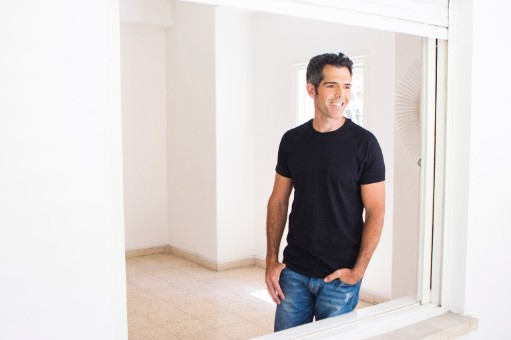Tal Segev Opens a "New Page"
Tal Segev’s musical silence was caused by a rare ear disease. How did he return to creating, and what connected him to Yonatan Razel? In this fascinating interview, he talks about the struggles with the disease and his connection to Judaism.

After it was discovered he suffered from a rare disease that forced him into a long musical silence, creator Tal Segev is making a comeback with an album called "New Page." The album consists of various duets with singers who collaborated with Segev. One of them is the duet "No Despair," with Yonatan Razel, which became the theme song of the 'Makor Chaim' yeshiva, where three teenagers who were kidnapped last summer studied. "This is my biggest success in the album," says Segev in an interview with Hidabroot.
Segev (41), a singer-songwriter and music producer responsible for many well-known and popular hits, is married to Sisi and a father of five children. About seven years ago, at the peak of his musical creation and work with musician Yaakov Lamai, everything was cut short. Segev suffered from a rare disease in his left ear, causing the sounds he hears to be out of sync with reality. This means Segev hears two different tones in both ears. Since his right ear was not affected, he knows what the correct tone is. Since falling ill, Segev withdrew for a year, avoiding contact with people, but then began a rehabilitation process, reaching a peak with the album's release and his ongoing performances.
"I am returning to music with my ear problem," says Segev. "I decided that this limitation cannot stop my great love for music. It took me seven years to overcome the problem, it hasn't fully gone away, but I decided to go all the way with it, making an album and starting to perform. The album is called 'New Page'—people might wonder why there is a need to open a new page? Is the old page not good? For me, the old notebook ended and a new one opened, but it's still the same notebook."
How did the audience receive you?
"With crazy love. We were deeply moved together, mainly friends and family who knew about the issue and hadn't seen me involved in music for a long time. It was joyous. It's a kind of victory over the problem. It shows that with love, faith, and health, everything is possible."
Tell us a little about the creation process of the album?
"The album is called 'New Page'. A few years ago, Berry Sakharof called me after he heard about the problem. He offered his help. Some time passed, and I grabbed the opportunity. I asked him to produce some songs for me because I should not be exposed to noise. That’s how it all started. Since I should not be exposed to loud noise, I sat in a room with a piano, recorded to the computer, and sent him the tracks to produce. Berry participated wholeheartedly, added four songs for me, and sang with me too. After that, I sent songs to artists I admire with the thought 'Let’s see what happens.' About a year ago, I kicked into high gear, refining things to have duets. Everything flowed with love, and the CD is ready."
 Tal Segev
Tal SegevOne special collaboration on the album is with Yonatan Razel. "I knew him from the days we served in the military band," recalls Segev. "I saw him playing a song by Matti Caspi. After I wrote the song 'No Despair,' I decided to send it to him. I didn't know if he would agree to a duet, but he loved the song and we sang it together. We performed this song together at a rally for the kidnapped teenagers, before the tragic end was known. My biggest personal success is that the song became the theme song of the 'Makor Chaim' yeshiva."
Why did you choose the name No Despair?
"When you go through something on your own, it takes you to the depths of despair, but only from there can I rise clean to a place of no despair. If I said 'everything's okay, there’s no problem,' I wouldn’t have reached this point. The sun shines all year and all the time. It illuminates, but half the time we are asleep, and half the time it doesn't shine on us, it shines elsewhere on the globe. Hence, we can be illuminated and enlightening."
Discovering the ear disease was a quite shaking experience in Segev’s life, especially due to his occupation in music. "I have a rare problem whereby each ear identifies sounds differently," he explains. "I hear every sound in two different ways. My right ear was not damaged, so when you play a song, you hear a completely different scale in each ear, and I know the correct scale because my right ear wasn't affected. It is a rare problem with various causes, but it's a gift."
A gift - really?
"Because of this, I reached conclusions and insights about life and friends, which I couldn't arrive at while being in the life race. It means I have more calmness, tranquility, and inner strength." A new page? People might wonder why there is a need to open a new page? Is the old page not good? In the old page, the notebook ended and a new one opened, but it's still the same notebook.
How did you even realize this?
"I was working in the studio with Yaakov Lamai, one of the well-known producers, and one day while playing, I told him 'Yaakov, I'm hearing incorrectly, I have an ear problem.' From that day, I have not returned to play in the studio. In fact, I still haven’t returned to work. I finished the album, not exposing myself to noise. I record the song myself at a volume I can tolerate and send them to Berry Sakharof. The studio noise only worsens the problem. Therefore, I scheduled 2-3 performances in advance, to expose myself to noise, overcome it, and continue. The first performance was amazing, but afterward, there was a deterioration in the ear, although it settled back to normal after two weeks."
Watch: Interview with Tal Segev from the show "In a Different Direction":
What do you avoid due to the problem?
"Any kind of loud noise, cinema, birthdays, malls, when they prune on the street, cutting with a disc saw - as soon as there is noise, I don't come close or move away from it. Initially, it was very difficult, I secluded myself for a whole year, but slowly I returned to myself. In terms of family - it seems today we are even closer and more accommodating of each other - that's why it's a gift. Everything has a purpose; the question is where the person takes it."
Concurrently, Segev underwent a process of spiritual strengthening in Judaism. "I study, stay in touch with a righteous rabbi whose name I prefer not to mention, and occasionally take upon myself something I can handle that doesn’t harm the family. Mainly it's a lot of self-work, a desire to cleave to the Creator, and to understand that time is short and the work is great. I know there is a whole world of creation and we also were created. I realized there is a shrine of music, which is very high where tones and melodies come from. It seems to me that's the foundation since we don't create the notes, they exist; we connect them in a certain way."
What are you doing these days?
"Spending a lot of time with the family and trying to send songs to singers I've worked with over the years like Shlomi Shabat, Yishai Levi, Eyal Golan, Moshe Peretz, and Dudu Aharon. Everything is good."
With Hashem's help, where will we see you in a year?
"Before the ear problem, I would look at life differently. Nowadays, I don’t have a concept of 'a year from now.' I hope that tonight I go to sleep, and tomorrow I wake up and hear that Am Yisrael is living and happy. I must not forget the problem and the privilege I received to work on it. I have the opportunity to implement and channel different insights. I could have blamed the whole world and suffered all my life, but that's not me. I wish only good, and I thank Hashem."

